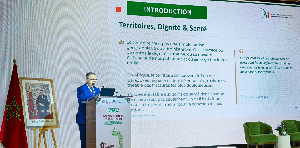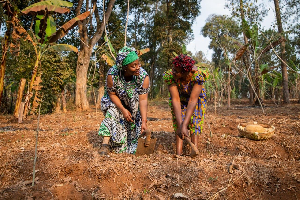Crude Oil production recorded a decline of 13 per cent in 2016 despite the fact that Ghana’s second major oil production field, the Tweneboa-Enyenra-Ntomme (TEN) Field came on stream.
The TEN Field came on stream in August 2016 and actually contributed 16 per cent to the annual production, but it dropped from 37.41 million barrels (mmbbls) in 2015 to 32.30mmbbl last year.
The Public Interest and Accountability Committee (PIAC) has explained that the crude oil production shortfall would have recorded approximately 28 per cent but for the TEN Fields.
At the launch of the 2016 PIAC Annual Report on Management of Petroleum Revenue in Accra on Thursday, officials of PIAC said Ghana lifted 4.86mmbbls from the Jubilee Fields in 2016 representing 18.06 per cent which is consistent with the country’s shareholding in the field.
The sole lifting undertaken by the Ghana Group from the TEN Field in 2016 also represented 18.60 per cent of the total liftings made by the TEN patrons.
Mr Mark Agyemang, Technical Manager at PIAC, who presented the sixth annual report of PIAC, at the launching noted that, actual petroleum receipt in 2016 was $247 million, being 29 per cent lower than the budgeted amount of $348 million and translating to 38 per cent year-on-year decline in annual petroleum revenues when compared to the 2015 receipts of $396 million.
Apart from the Corporate Income Tax (CIT) which exceeded target, none other sources of petroleum revenues achieved set targets, he said.
Ninety-two per cent ($27million) of the CIT received in 2016 was, however, in respect of tax liabilities that Tullow Ghana ought to have paid over the period 2011-2014.
A total of $229 million dollars, representing approximately 93 per cent of total petroleum receipts was allocated during the reporting period.
Mr Agyemang announced that an amount of $98 million, (about GHS 388 million), representing 70 per cent of the net amount $140 million was transferred to the Government of Ghana for further distribution and 42.95 per cent of actual disbursement) was transferred to the Annual Budget Funding Amount (ABFA) account in 2016.
The remaining 30 percent ($42 million) of the amount received by the government to be distributed to the ABFA and Ghana Petroleum Funds (GPF) in 2016 was transferred to the GPF with the Ghana Stabilisation Fund (GSF) receiving $29 million which is 70 per cent and the Ghana Heritage Fund (GHF) receiving $12 million.
Moreover, the Ghana National Petroleum Corporation (GNPC) in 2016 also received a total revenue allocation of 88 million dollars, which is 38.64 per cent.
At the end of 2016, the total balance in the Petroleum Holding Fund Account (PHF) was $27 million dollars which comprised undistributed petroleum receipts amounting to $27.369 million dollars and a mandatory minimum balance of $200,000.
Meanwhile, four priority areas selected by the Finance Minister to be funded with the Annual Budget Funding Amount from 2017-2019 with their projected 2017 allocations include; Agriculture with a projected allocation of 156 million cedis; while Physical Infrastructure and Service Delivery in Education was 211 million cedis.
Physical Infrastructure and Service Delivery in Health was also projected to receive an allocation of 50 million cedis, with the Road, Rail and other critical infrastructure development pegged to receive an allocation of 76 million cedis.
The PIAC was also projected to receive an allocation of 1.9 million Cedis for the period of 2017-2019.
The report however recommended that GNPC should desist from spending part of its dwindling allocations on non-core businesses such as financing of the Western Corridor Roads.
The GNPC was also asked to disclose what steps it had taken to retrieve the $50 million loan it advanced to the Ministry of Finance in respect of the Western Corridor Roads.
The report also advised that the ABFA allocation to road infrastructure should continue to be spent on fewer road projects so as to ensure timely completion of beneficiary projects.
The Ghana Revenue Authority (GRA) was asked to ensure that auditing of tax returns filed by the Jubilee Partners was carried out expeditiously so that any additional assessment payable was paid on time.
Business News of Thursday, 15 June 2017
Source: GNA













